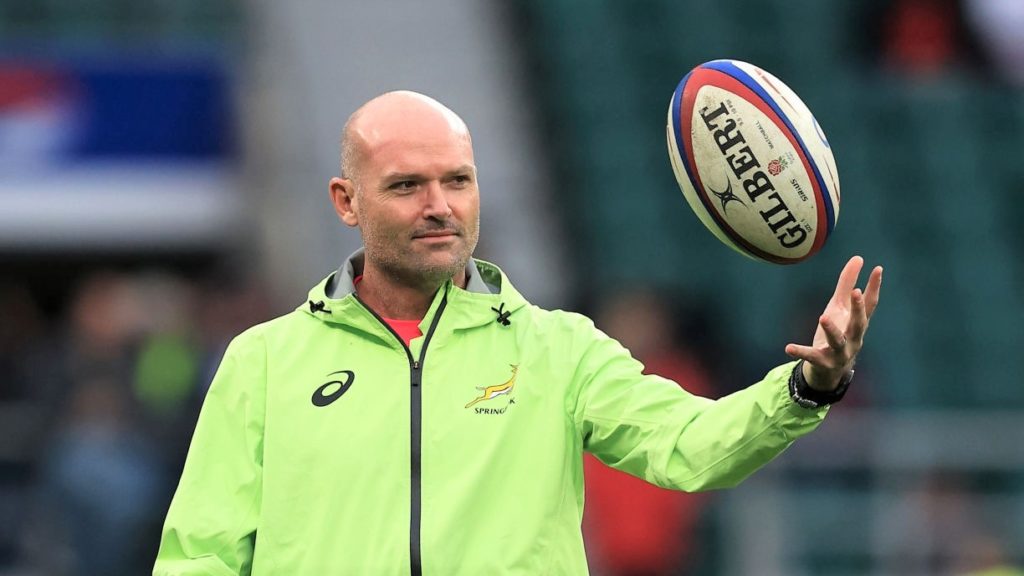Jacques Nienaber is far removed from the stereotype of an international rugby head coach.
The Springbok coach was not a leading player –- although he was a first XV centre at Grey College in Bloemfontein, one of South Africa’s leading rugby schools.
Nor did Nienaber, 50, plan to be a coach. Instead, he qualified as a physiotherapist and hoped that one day he might work with the Springboks.
He met Rassie Erasmus, then a player before becoming the 2019 Rugby World Cup-winning coach, during compulsory military training in the last years of apartheid in the early 1990s.
MORE: Rassie ‘not bothered’ by Bomb Squad furore
Their friendship blossomed when he landed a job as physio for the Free State provincial team.
“I spent a lot of time talking to Jacques while I was on the physio bed,” said Erasmus, who was impressed by Nienaber’s clarity of thought and ability to analyse the game.
“I became a coach as soon as I stopped playing,” Erasmus recalled in an interview with Rugby World magazine. “I brought Jacques in as a conditioning coach right away.”
The next step for Nienaber in an unlikely coaching career was to be put in charge of the Free State team’s defence.
“His passion, knowledge and work ethic around defence was evident even back then,” said Erasmus.
“He’s very good with people and in terms of communicating what he wants.”
Erasmus and Nienaber worked together at Free State, the Stormers in Cape Town and Munster in Ireland.
Nienaber also had a stint as defence coach of the 2011 World Cup Springboks under then head coach Peter de Villiers.
Erasmus was appointed director of rugby in South Africa in 2018 and again ensured that Nienaber was his lieutenant. Their aim was to build a long-term strategy culminating in the 2023 Rugby World Cup.
They reasoned there was not enough time for victory in the 2019 World Cup in Japan to be a realistic goal.
But with Erasmus taking over as head coach, the partnership took the Springboks all the way to the title.
Nienaber took over from Erasmus in 2020. It was his first head coach position.
MORE: Canan to start at World Cup
It is still, however, the Erasmus-Nienaber show, with Erasmus remaining heavily involved in planning.
He has also acted as a lightning rod for controversies such as his role as a “water boy” and a video criticising refereeing decisions during a winning 2021 series against the British and Irish Lions.
Nienaber, by contrast, prefers to keep a low profile. He described himself as “Hubby, Dad of two great kids” on a now-inactive X (formerly Twitter) account.
SA Rugby responded to an AFP request for an interview by saying “Jacques prefers not to do one-on-ones”.
When he and Erasmus gave a press conference in May, most of the questions were directed at Erasmus, who also gave the most quotable responses.
In the shifting process that led to the selection of South Africa’s 33-man World Cup squad, Nienaber kept a close watch on some 60 players.
Nienaber used 38 individuals in four matches before the World Cup squad announcement, which he said was to give a wide group of candidates as many opportunities as possible. What was not obvious, however, was the make-up of a likely first-choice team.
Unusually, Nienaber announced well in advance of the World Cup that he would quit after the tournament and move to Ireland, where he will coach Leinster.
“My family knows when and where we need to get a house, when to get the dog settled and all of that,” he said after the announcement in April.
“It literally frees you up to put all your energy into Springbok rugby from now until the end of the World Cup.”
It was a typically down-to-earth comment from a man who said before a Test against Argentina in Johannesburg in July – his last in charge of a home Test – that circumstances had exceeded his expectations.
“A guy works hard and always hopes and believes that one day you’ll get a chance to be involved in just one Test with the Boks and maybe go to one World Cup.
“It’s more than a dream that came true. I should have just been a physio in Bloemfontein.”
WATCH: Rassie ambushes World Rugby
© Agence France-Presse
Photo: David Rogers/Getty Images





